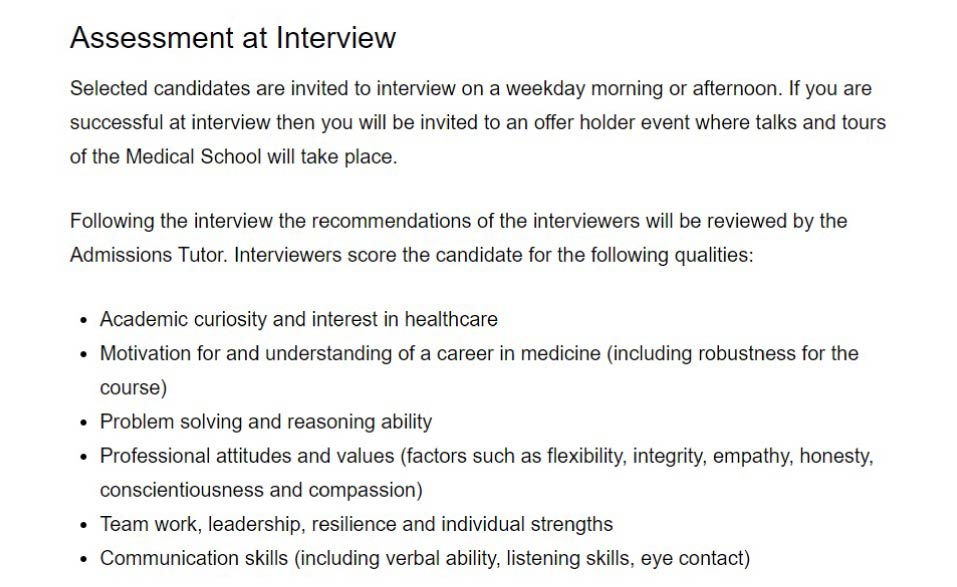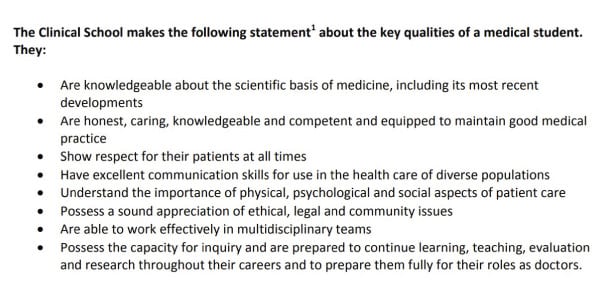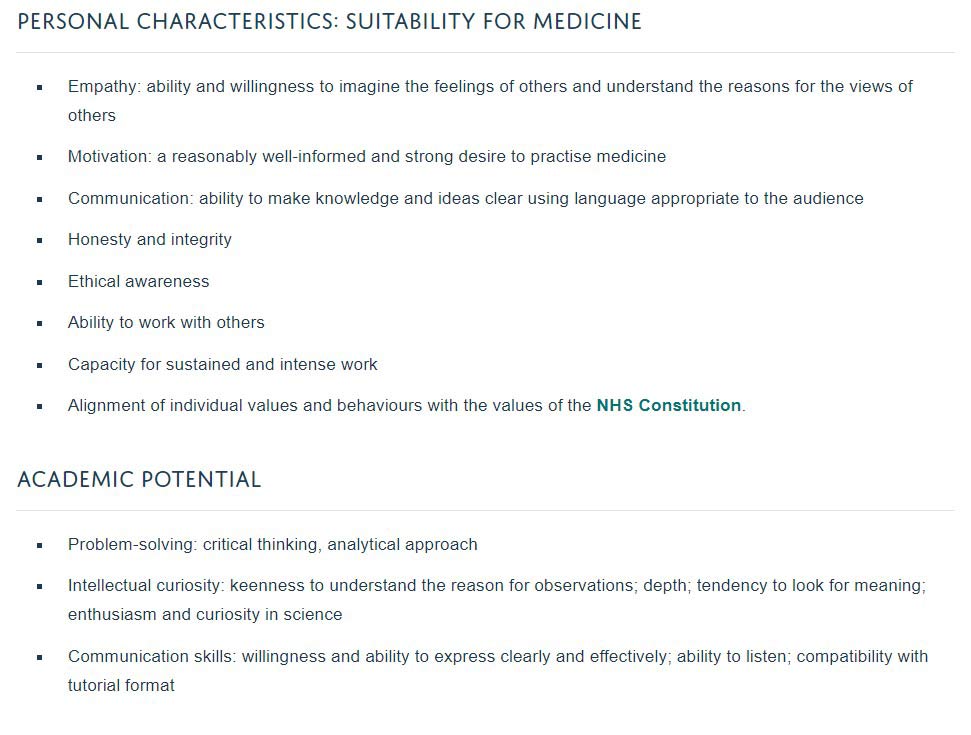The key to answering questions convincingly and confidently, whilst providing sufficient evidence from your personal experience, is to create a database of all the qualities the Medical Schools are looking for (which in turn are the qualities of a good doctor, as described in the previous chapter).
As mentioned earlier, Medical Schools are all looking for the qualities that show that a student will one day become a competent doctor. The General Medical Council (GMC) carefully regulates this selection procedure and expect Medical Schools to do their utmost in handing out offers to the right people. So what exactly are Medical Schools and the GMC looking for?
What are the key qualities?
Let’s begin with looking at some examples from UK Medical Schools, starting with UCL. This is what UCL Admissions Tutors look for in a candidate at Interview:
Now let’s look at what Cambridge states as the ‘Key Qualities of a Medical Student’:
Lastly, this is Oxford’s:

INTERVIEW TUTORING BUNDLE
Need help demonstrating key qualities of doctors to Admissions Tutors?
Signing up to the Interview Tutoring Bundle means you’ll be guided by a Medicine interview expert who will help you demonstrate that you meet the key selection criteria Admissions Tutors look for.
Interview Crash Course
Interview Crash Course
Need help demonstrating key qualities of doctors to Admissions Tutors?
Signing up to the Interview Bundle means you’ll be guided by a Medicine interview expert who will help you demonstrate that you meet the key selection criteria Admissions Tutors look for.
Want to learn how to Interview like a pro, then this bundle is the one for you…


Why have we shown you three examples? Hopefully, you should be able to draw out the similarities between each Medical School. There are core qualities that Admissions Tutors look for which is great when you are writing your Personal Statement and preparing for Interviews as you will likely be able to tick off multiple qualities that cover all Medical Schools.
Your aim at Interview is to try to get the interviewers to tick these points. Put simply, this means you shouldn’t just talk about anything, and instead, focus on personal experiences that demonstrate the qualities of a good doctor.
Key Qualities examples
Here is an example of a list of attributes and matching experiences. Note that even though you’ve (hopefully) already put a load of experiences and qualities in your Personal Statement, it doesn’t give you sufficient space to elaborate or to bring in further experiences.

Use the Interview to say things you wish you said in your statement and to demonstrate you’re genuine in what you say you did. Here is a list with examples of qualities/attributes and the corresponding ‘proof’ next to them.
1. Effective Communication
- I took part in regular debating workshops and competitions at school – I had to articulate complicated points and present arguments to an audience.
- Also, I had to be respectful towards other people and their opinions.
2. Good Teamwork
- I led a team for the school’s enterprise challenge: we had to design a business plan and pitch for a phone application. Good teamwork was the reason we won.
- During my work experience in hospitals, I shadowed a doctor who was in an MDT that was treating a patient with muscle dystrophy. I worked closely with various people, such as physiotherapists, nurses, other doctors, etc.
3. The Realities Of Being A Doctor
- I shadowed a junior doctor for a day – I contributed by helping with routine paperwork, filing, phoning up GP surgeries, inserting data into a computer, etc.
- He stressed how fulfilling it is to see a patient get better and that medicine surprises you all the time.
4. Leadership and Handling Pressure
- I led the charity week committee at school which raised £16,000.
- I had to delegate tasks to team members, as well as motivate the group when times were bad and I realised how important it was to listen to individuals.
- I witnessed a surgeon make the decision to call off surgery because the risk of intervention was just too high. He made the final decision alone but he considered people’s opinions.
5. Dedication and Commitment
- I met a consultant radiologist who tried discouraging me doing Medicine – he had spent his whole life studying and he had little time for other activities. It shows that students need the commitment, determination and drive to carry on, no matter how hard things get.
- I wasn’t always a top student – I lacked commitment and dedication for many of my first few years. I realised I had to change, and decided to change the way I approached studying and attitudes towards work, becoming more committed to the things I do.
6. Humility and Honesty
- During my work experience with a cardiologist, she said humility and honesty are very important qualities. Doctors easily turn away from admitting their wrongs and seeking help.
- I found A-level maths quite difficult initially – I had to swallow my pride and seek help from friends and teachers to get my head around the concepts.
We have plenty of free guides available at 6med to help you understand these qualities better, including resilience, empathy and ethics. If you are looking to demonstrate these qualities effectively, our Medicine Mastery Bundle helps you to explain the qualities in your Personal Statement and during your Interviews.
The database of Key Qualities
The idea behind this ‘database system’ is that you’ll be able to mix and match points when and if you need to. The amount of detail to include in your ‘experiences’ column is up to you, but the list/table should be used to help you review and memorise the most important points.
It’s so easy to walk into the Interview room, not prepare, and just rely on your memory to conjure up all the things you’ve done months ago and hope it gets you through. Don’t leave anything to chance and be sure you know what experiences you’ll talk about on Interview day.
If you get a general question about work experience, you could mention perhaps three or four of your experiences in hospital and what you learnt, but then also relate it back to your personal experiences, slipping in an example of good teamwork in the school football team.
Remember, you need evidence for every point you make, and you must show and prove your qualities whenever you get an opportunity. The more reference experiences you can build up in your database, the more convincing and powerful your answers will be and the better you will perform at Interview.
Sit down, open up your laptop or get out a notebook, and start keeping track of all your experiences, both the ones you’ve already mentioned in your Personal Statement and ones you haven’t considered yet. On top of that, keep track of the most important qualities of a good doctor, and start thinking about how you have and will develop those qualities.

INTERVIEW TUTORING BUNDLE
Walk into your Interview with confidence with help from 6med.
Signing up for 6med’s Interview Tutoring Bundle means you’ll be guided by Medicine Interview experts who will help you face the toughest Interview questions and come out on top.
Interview Online Course
Interview Online Course
Prepare effectively so you walk into your Interview filled with confidence.
Signing up to the Interview Bundle means you’ll be guided by a Medicine interview expert who will help you face the toughest Interview questions and come out on top.
Want to learn how to Interview like a pro, then this bundle is the one for you…




